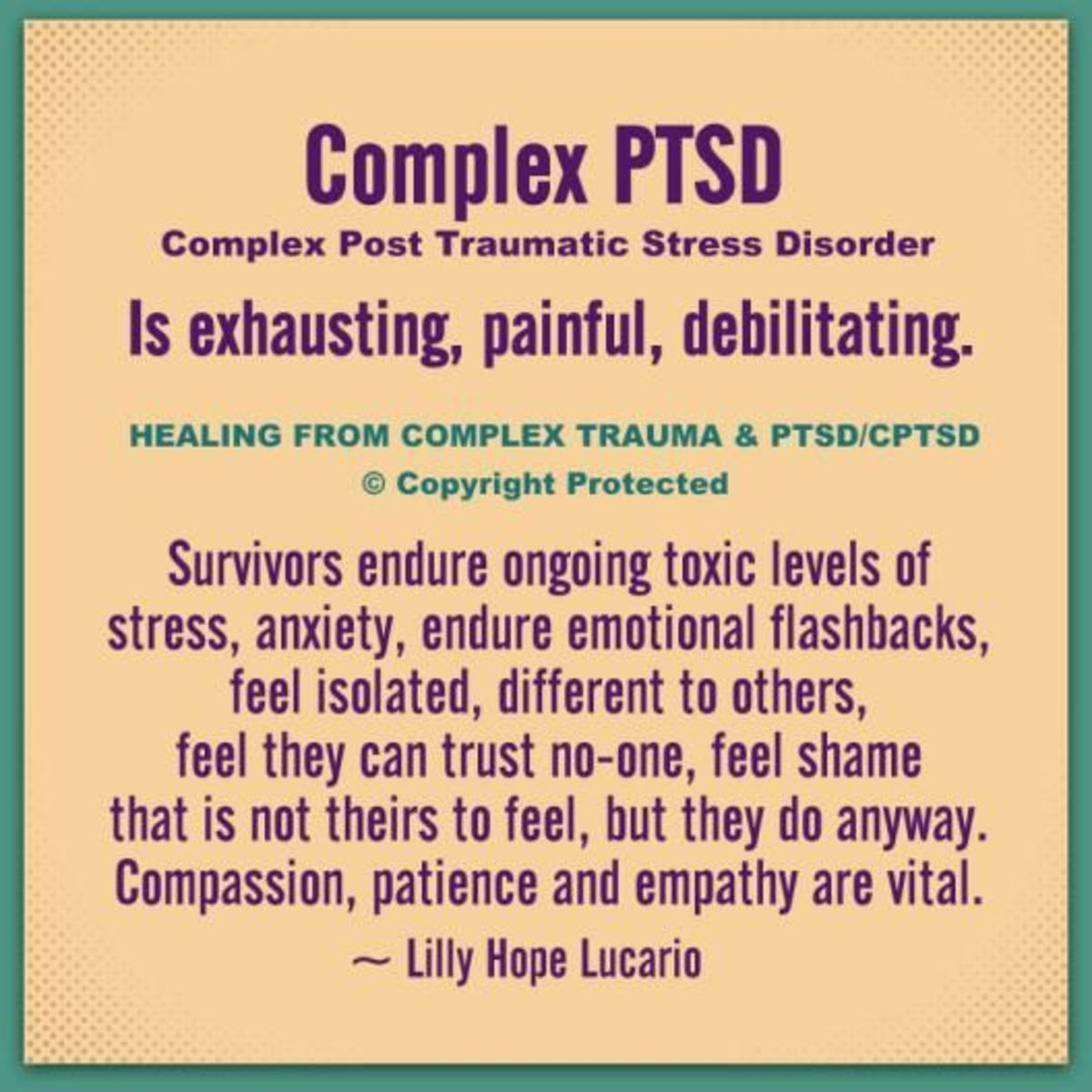Countering Myths About PTSD
I was raised by parents who had the loving, nurturing and caring personalities that many voracious piranhas have for a lost and abandoned kitten...otherwise, they were wonderful, brilliant, hardworking, church-going, upstanding, and law-abiding citizens who were well-loved by their community and far kinder to animals and to other people's children than they were to me; this article is about how I gained great recovery, joy, and self-actualization in my resulting issues with post-traumatic stress disorder by being forced to enter into mandated counseling, mental institutions, and parenting classes as punishment for their actions and then later decided to enter into additional counseling to recover from all that counseling while my mother and father were allowed to get away with it all scot-free, and I was always told that I was the abusive one for having forever disowned them as my form of revenge...and how others with similar situations and histories can learn to cope.
It began when I was still a pig-tailed little ankle-biter who decided that reporting the abuse to a teacher, social worker, or any other responsible, trusted adult would be an awesome idea. I divulged how my parents beat, starved, and tortured me in many other heinous ways, and was always given very profound, well-meaning, and deeply dramatic feedback in return.
"Well, at least think of all the other kids worse off than you are. Think of all the times your parents haven't beaten you. Besides, there must be something you're doing, or not doing, for them to be whaling the living daylights out of you anyway."
When I grew up, I allowed personal responsibility as an adult to kick in in order to jumpstart me into discussing my traumatic past with therapists as I was aware of their extensive education, impressive credentials, and outstanding expertise in dealing with those with complicated emotional problems and incredibly abusive backgrounds such as myself, as well as all the cool degrees they always had hanging on their office walls. I told them about my p.t.s.d. symptoms including emotional detachment and disassociation, avoidance of people and distressing situations that reminded me of past traumatic events, inability to feel love, a feeling of being extremely emotionally shut down, and etc., then I received the most enlightening, encouraging, and eye-opening input I'd heard about in a while.
"Well, it was a long time ago so you should just look for your parents and just forgive them because the past is still the past and your parents are still your parents."
When all else fails, turn to the church, I assured myself. After all, I thought, its members are only expected to show the love of Christ; in fact, they place themselves under obligation to do so.
"Well," they said," the Bible says we're all sinners, and so because you hated your parents since you were a child, you are just as bad as they are, so if you don't forgive them and accept them back in your life then you are going to burn in hell forever...imagine that, being in excruciating pain for all eternity, suffering for all of your vile deeds...and oh, did I mention that it was forever and ever and ever?"
Suffice it to say that I'm certain I understand the reason that a number of statistics indicate that anyone with ownership of a knife or pistol or submachine weapon or a bazooka or a trained crocodile or a whoopee cushion any other dangerous weapon is more likely to use it to harm someone other than a mugger or a burglar and why I myself have always judiciously decided, except in my most colorful and creative of fantasies, to never acquire possession of one. In time, I decided that likely no one except myself would ever understand the depth of my experience nor the extent of the damage and agony it has caused me. It's why I found that I was better off turning to more stable, balanced, and mature adults in positions of high authority and power, such as my parents, for help.
In all seriousness, I've come up with suggestions for other p.t.s.d. sufferers who may encounter those who say similarly stupid and inappropriate things to those they come to for guidance. Please note that your responses might depend on their relationship to you. If these are people you come into contact with regularly, you might be diplomatic and say something like, "I came to you hoping to receive some measure of understanding, not [fill in the blank.]" If you're getting these remarks from strangers, I'd tell them, "Forget what I told you; obviously I've come to the wrong person for advice," or "Try living my life for one day, if you've got the guts," or "Take a flying leap of a tall high-rise you #@%!!" or whatever else works for you.
The real solution is to avoid these people entirely and to start identifying those who are safe to share your experiences with so you can avoid the religious mumbo-jumbo and the just-get-over-it-already commentary. To be certain, only we know what we've experienced, but there are others who have had their own experiences, and they, too, have come away deeply wounded and in need of compassionate understanding; our task is to find some of these people, people who we can talk to who will know what it's like to be living a surreal life.
There is an expression that is used in many recovery groups that many may be familiar with: "The only way out of your pain is to go through it." I later realized that the people I'd been talking to were simply trying to get me to go around what's happened to me, or to minimize it, or even see it as a penalty for having lived a bad life. Eventually, I indeed was sure that if someone else told me "Get over it" that I was going to take a gun and shoot them and not myself.
The real truth was that my early painful experiences as a child and an adolescent were continually relived because they remained unresolved. Finding a competent therapist and a strong p.t.s.d. support network of genuinely caring, understanding healers proved the key to helping me work through previous traumatic experiences that had kept me stuck in emotional pain. Others with p.t.s.d. will hear us when we speak of the emotional numbing, hyper-vigilance, recurring flashbacks and nightmares, and extreme loneliness that those living with this condition experience everyday. Our responsibility is to find these people. Where? My suggestion is to find a counselor who deals specifically with p.t.s.d. I myself found that many therapists, religious leaders, parenting experts, etc. haven't a clue when it comes to this disorder, which is why I'd come across many who would say something like "So what if your mother pulled your hair out when you were four and your father tossed your down the stairs when you were eight..it's in the past, so what can you do about it?" and "Well, at least you didn't suffer as much as Job," and "You allowed yourself to be nearly choked to death by the father of your child while you were pregnant by him and you say the prolonged physical and emotional abuse you endured from your biological parents since you were a toddler set you up for that? You monster!" They didn't realize that p.t.s.d. is experiences as a here-and-now effect based on a then-and-there cause. They also don't realize that they sound like Job's friends.
So in summary:
1) Find a good p.t.s.d. therapist.
I've recognized that the issue of my parents kept recurring in my inner dialogue with myself because there was a reason for it. Therapists well-trained in trauma and abuse were able to help me to make the journey I needed to make in order to recover the self I lost so long ago at the hands of malicious, vicious and sadistic parents.
2) Once you have found a good therapist, ask that therapist to refer you to a p.t.s.d. support group.
Finding other empathetic, understanding individuals can work seeming miracles in untangling and expressing past emotional wounds that hurt now: sadness, anger, loneliness, betrayal, humiliation, and so on. This is the beginning of the journey down the road of rediscovery.
3) Dismiss those who have hidden agendas or show their ignorance when you share something with them.
Mean what you say, but don't be mean you say it. The quacks, nincompoops, and butt-faces..er, uh, clueless individuals in question are not able to help anyway. In reality, they're unable to help even themselves.
One of the wonderful benefits of working through harrowing early trauma is that you realize you're becoming healthier, and as a result, you begin to recognize those you can trust and not trust. You do so because you begin to trust yourself and your intuitions about the people around you: who's healthy, and who's not healthy.
Ultimately, I found that I could rescue the little girl who was lost so long ago, a little girl who only wanted to be loved and cared for by parents who were happy she was their child. As I didn't get that, I've recognized that this was among the things I needed. So a nurturing, caring support system has gone a long way in helping to support me in my efforts to undo the past...and I gather that my decision to tell my parents: "See ya! Wouldn't wanna be ya!" when I was old enough to leave the home and certainly don't to plan to see the dorks nor those who side with them over me for whatever reason ever again, has also had a little to do with my significant progress and sanity maintenance as well.
As I stated from the outset, I want to stress the importance of avoiding uncaring, uneducated folks whom you share past painful events with in the first place. I hope that the above helps others with p.t.s.d. in some small way. We deserve to be happy, and our remaining true to our gut instincts, and to ourselves, will help us to achieve that happiness.
To learn more about proactive self-care in regards to coping with and recovering from p.t.s.d., including about the healing power of the breath, review the video [below], which is hosted by renowned trauma expert and author Emma Seppala.
Ms. Seppala shares an excellent discourse about how traumatized war veterans have been able to treat their trauma, both past and present, as she employs a comprehensive demonstration about calming breathing techniques. I personally have found proper meditative breathing helpful in dealing with p.t.s.d., and hope it will also prove helpful to other p.t.s.d. sufferers; however, again, it is always best to start any new health routine under the advice and care of a trusted therapist and/or physician.






